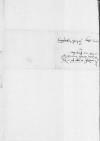Etsi raro meis litteris Dominationem Vestram Reverendissimam visito, non hoc accidit quin Dominationis Vestrae effigiem in mei pectoris profundo semper colam, sed loci distantia, impedimenta multa, quibus maxime et continuo detineri soleo et nuntiorum certorum incommoditas faciunt, ne possim meo satisfacere desiderio. Nunc tamen magnifico domino ⌊Fabiano⌋ nostro in ⌊Poloniam⌋ eunti has proposui Dominationi Vestrae dare litteras, quibus intelligere posset illustrem dominum meum dominum ⌊Granvelam⌋ nosque omnes incolumes, Dei gratia, et benevalentes, quod de Dominatione Vestra optare non desistimus. Intelleximus per dominum ⌊Fabianum⌋ Dominationem Vestram Reverendissimam habuisse alium episcopatum in triplo pinguiorem primo, quod Dominationi Vestrae maxime gratulamur precamurque superos, ut Dominationem Vestram Reverendissimam superstitem longaevamque in praefato episcopatu conservet et ad maiora, ut meretur, perducat. Nihil enim mihi gratius accidere potest, quam cum scio Dominationem Vestram Reverendissimam fortuna favente velis plenis in hoc saeculo navigare. In alioque Dominatio Vestra post huius vitae cursum, cum Deo gratum fuerit, ut felicitius naviget, ⌊Christum⌋ Omnipotentem precamur, qui Dominationem Vestram tueatur. Dominationis Vestrae fratres, dominum videlicet ⌊Bernardum⌋ et dominum ⌊Georgium⌋ salutatos maxime cupio Philipumque et ceteros omnes notos, quod si Dominationi Vestrae non esset molestum meis verbis eos salutare rem mihi et gratam et iucundam faceret Dominatio Vestra. Cui humillime me commendo et rogo, ut suis litteris me apud dominum meum illustrissimum ⌊Granvelam⌋ commendatum habeat, non quin ipse ex se habeat me satis commendatum, sed solum, ut videat Dominationem Vestram non mei immemorem. Cum ero in canonicatu meo Bisuntinensi non negabo, quin Dominationem Vestram Reverendissimam aliquando visitem in Polonia{m}.

